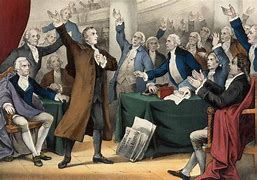Widgetized Section
Go to Admin » Appearance » Widgets » and move Gabfire Widget: Social into that MastheadOverlay zone
TikTok: A Lesson in Rights
The views expressed are those of the author and do not necessarily reflect the views of ASPA as an organization.
By Eric D. McLeod
January 17, 2025

At this point in history, we are all members of a global society. No longer are we limited to local, state or even national interactions. As technology has advanced, we have all become more connected globally at virtually instantaneous speed. The introduction of the World Wide Web opened the door initially, but it was social media platforms that truly found a way to connect each of us as individuals across the world in real time.
For many, social media is used to connect with friends and family near and far. Sharing silly moments, sad moments, life milestones and children and grandchildren growing up. For others, it is a platform to generate income; for some, it is their entire livelihood. From content creators who make their living through advertising revenues to businesses that can reach a larger customer base to increase sales.
As with every advancement in human history that was intended to better humanity, there are those who seek to find ways to take advantage of it for nefarious means. A great example is the invention of dynamite by Alfred Nobel. His intent was to find a better, safer, more efficient, and effective way to blast rocks during construction. Nobel went on to leave his vast fortune to fund the annual prizes bearing his name, which are awarded to individuals for their work in different fields with the greatest benefit to humankind. As all are well aware, it did not take long for dynamite to be used to hurt others. As the science and technology of explosives advanced, so did their uses to inflict harm.
The same appears to be true with social media, at least according to the United States government, who claim that one specific platform, TikTok, which happens to be owned by a Chinese company, ByteDance, is a national security risk. With bipartisan support, Congress passed the Protecting Americans from Foreign Adversary Controlled Applications Act in early 2024 to ban TikTok in the United States. President Joe Biden signed it into law. This law is being used to specifically ban TikTok from operating in the United States and to prevent Americans from using the platform.
Attorneys for TikTok appealed to the courts only to have an appeals court, consisting of judges appointed by presidents from both sides of the aisle, unanimously uphold the law. TikTok lawyers pushed on, and the highest court in the land accepted the case. At the time of this writing, the Supreme Court of the United States (SCOTUS) began to hear arguments in the matter known officially as TikTok Inc. and ByteDance Ltd. v. Merrick B. Garland, in His Official Capacity as Attorney General of the United States.
The government is proclaiming it is acting to protect the First Amendment in the United States “from a foreign adversary nation,” as the Chinese government could potentially force ByteDance to release sensitive data on American users or dictate the spread of misinformation propaganda through the platform’s algorithm. In so doing, they are infringing on the First Amendment rights of individual citizens. While ByteDance is a foreign entity not entitled to Constitutional protections, the more than 170 million American citizens who use the TikTok platform for both business and pleasure are entitled to those rights.
To counter this, the government made provisions within the new law that would allow Americans to continue using TikTok only in the event that ByteDance sells the platform to a company not based in one of the countries not designated as a Foreign Adversary by the U.S. government. ByteDance has been clear that they will not sell the platform. To further complicate the issue, President-elect Donald Trump has stated that he would not allow the ban to go into effect. Timing is now crucial with the issue in the hands of SCOTUS and the new law set to go into effect on January 19, 2025, the day before Trump is sworn into office.
Conclusion
What rights do individual citizens in the United States actually have, and how guaranteed are they? The Bill of Rights of the U.S. Constitution was put in place to protect certain rights from being infringed on. Article IV, Clause 2, also known as the Supremacy Clause, states that the Constitution is the supreme law of the land. With wording that specific, one would think that the Framers intended for these rights to be protected, not circumvented. At what point do the interests of the federal government outweigh the Constitutional rights of American citizens? While national security is of vital importance, so is trust in the government. By its very nature, issues of national security must remain secret and not be provided openly to the American public. Should SCOTUS uphold the law, it would mean that the American public must blindly trust in the government while giving up some measure of their Constitutional rights, creating a slippery slope. Once the erosion of Constitutional rights begins, where will it end?
Author: Eric McLeod has a Master of Public Administration from California Baptist University in Southern California. He is currently in the DPA program at CBU. He has served the public for 17 years with the Riverside County Sheriff’s Department. Initially, he worked in crime scene investigations with their forensics unit. He is currently a deputy coroner with the Department, conducting death investigations. Email: [email protected]


Follow Us!